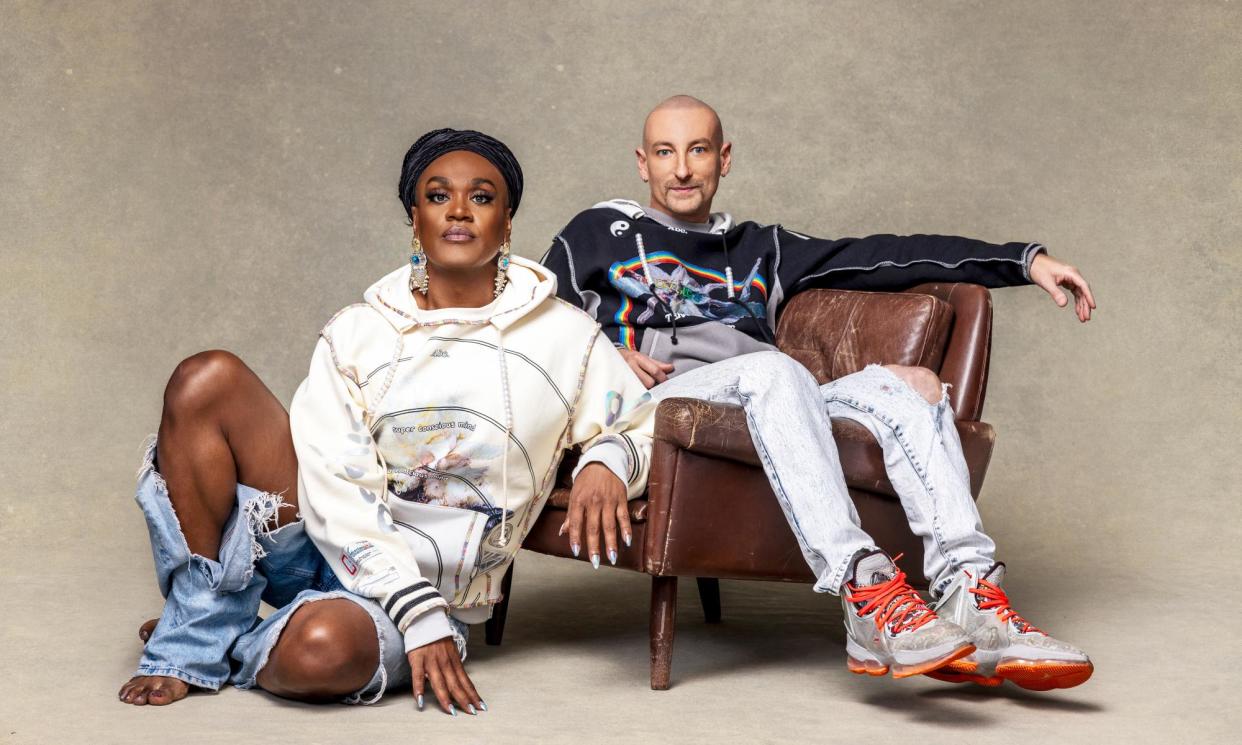Electric Fields on their unlikely journey to Eurovision: ‘I’m ready to prove a point’

Zaachariaha Fielding got his first taste of the joy of performing as a young boy growing up in remote South Australia.
“There was a place called Paraulpi about 10km from [our town of] Milili – the song grounds for all the children and the grandparents to do traditional Aboriginal dances,” he tells Guardian Australia. “I loved the performance element of it all – how the audience reacted, what the singers did, the design on the bodies – the whole production of delivering a show.”
It’s a long way from those inma (dances) in Milili to Malmö in Sweden, where Fielding will be heading in May. Together with keyboardist Michael Ross, the pair – also known as Electric Fields – will be representing Australia at Eurovision with their new track, One Milkali (One Blood), which incorporates the Yankunytjatjara language.
When we speak, the band is deep in preparation – but not allowed to give too much away. “We’re having so much fun materialising the way the costumes might connect with the lyrics and the performance will connect with the audience,” says Ross.
Australian audiences will be familiar with Electric Fields’ uplifting, ethereal pop songs: soaring vocals and pulsing club beats that have taken them to underground queer parties in Sydney, to the Western Australian desert, to Melbourne’s Hamer Hall.
But their Australian TV debut came earlier, by way of televised song contests: Ross reached the Top 6 of 2013’s the X-Factor with a cover of Diana Ross’ You Can’t Hurry Love, and Fielding made it to the grand final of the Voice in 2015, performing Tracy Chapman’s Talkin’ Bout a Revolution.
Neither imagined they would one day make it to the Eurovision stage – although they came tantalisingly close in 2019, coming second to Kate Miller-Heidke in a televised competition to represent the country.
“It’s such a major deal,” says Ross now. “We make art for the sake of it [but] I’ve always been deeply ambitious. My deep hope was always to impact the world, even in the smallest positive way.”
Coming out was not a simple proposition for Ross, who grew up in conservative, religious Queensland.
“I pretty much had to hide my soul up until I left school,” he says. “I had to try to walk differently, I had to move my hands differently. And it’s a very unique experience that only queer people would really understand – pretending that you’re the opposite of what you are.
“When I finally did come out and accept myself, I had to battle family for 18 years, and only really felt full acceptance in my 30s. Having endured that, there is a very deep strength that you acquire, and I use that almost every day – usually to stand up for other people who are being othered.”
For Fielding, growing up in a remote Indigenous community as a queer kid held its own unique challenges: queer sexuality, he says, is not something that is verbalised in his culture.
“With my family, I didn’t even come out … There was no reason for it. My brother reminded me of it a few years ago – he said, ‘You know, you didn’t really come out to us.’ I didn’t really verbalise it, I was just more being it.”
Fielding is also a successful visual artist who won the $50,000 Wynne prize for landscape painting at the 2023 Archibald prize. He says the stage is where he feels most free to express who he is. “We love challenging how far we can milk sorrow, how far we can milk joy … It’s a stage of freedom.”
Their performance will also be the first time a song incorporating Australian Aboriginal language has been part of Eurovision – a groundbreaking moment that comes with mixed feelings for Fielding.
“I feel really proud, even though my people were humiliated by their own country,” he says, reflecting on the unsuccessful voice to parliament referendum. “[It’s] phoenix rising vibes. Let’s move on together. Australia will eventually accept us as a whole country. I just feel really happy and ready to prove a point.”
Related: Eurovision: Olly Alexander and other competitors reject calls to boycott over Israel participation
The May event comes with its own political baggage. Thousands of artists from Sweden, Finland and Iceland have signed separate open letters demanding Israel be withdrawn from the competition due to the country’s ongoing assault in Gaza. Last week in the UK, more than 450 people signed an open letter posted by Queers for Palestine urging UK contestant Olly Alexander to withdraw; and Australia’s past Eurovision contestant Montaigne has also publicly called for Israel to be dropped.
Asked where they stand on the Eurovision boycott, Ross says Electric Fields see art as a bridge between people: “[Eurovision] is a place to increase connectivity, and we are just so focused on sharing our story.”
“Artists pick up what gets broken by stupidity,” says Fielding. “We’re focusing on healing – because the world is pretty grim at the moment. That’s what we will do on the Eurovision stage.”
The first semi-final of the Eurovision song contest will take place in Malmö, Sweden on Tuesday 7 May, and be broadcast live on SBS

 Yahoo News
Yahoo News 
